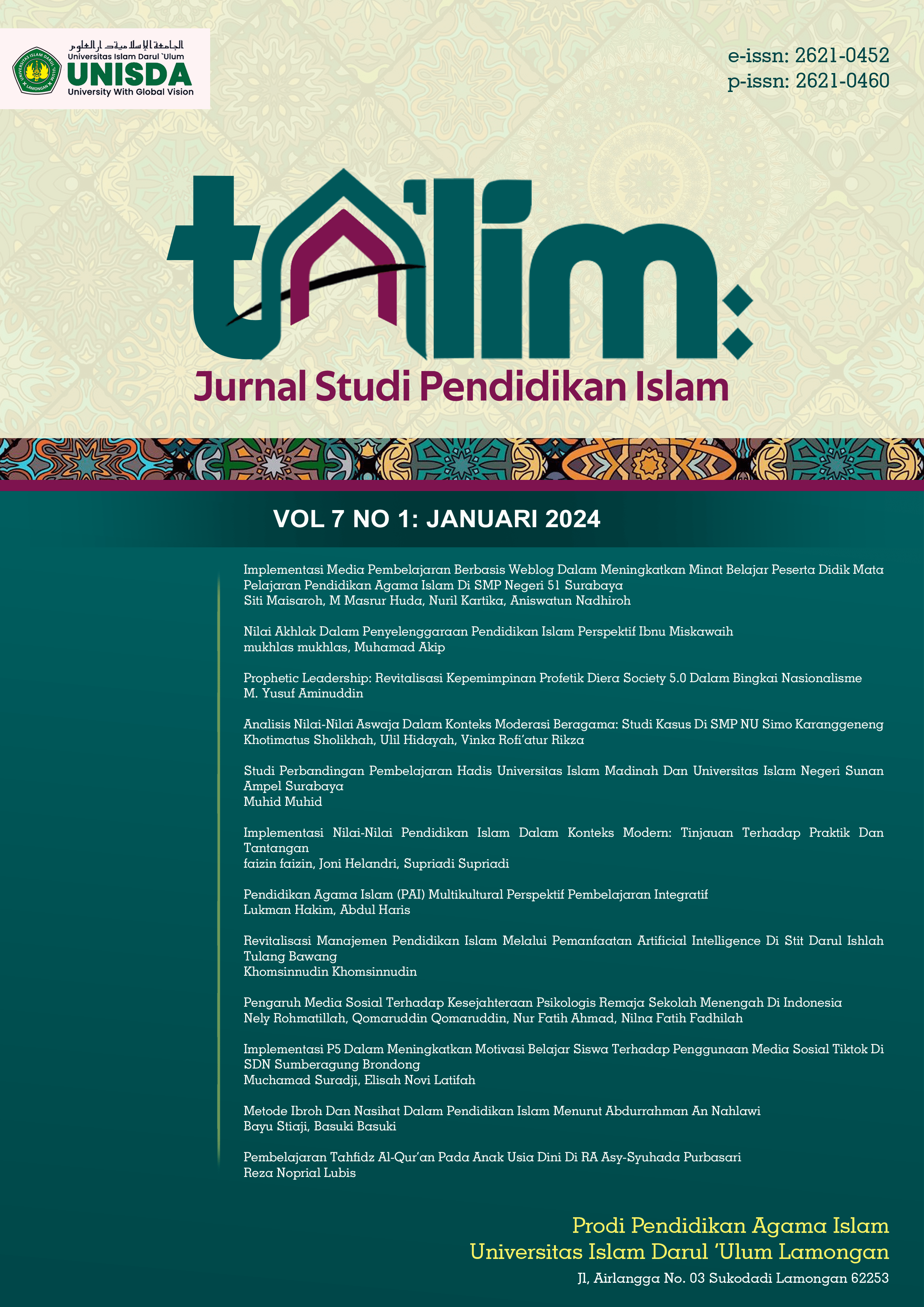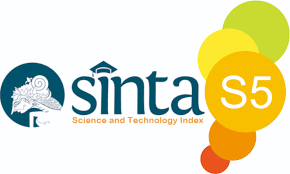REVITALISASI MANAJEMEN PENDIDIKAN ISLAM MELALUI PEMANFAATAN ARTIFICIAL INTELLIGENCE DI STIT DARUL ISHLAH TULANG BAWANG
Abstract
The Industrial Revolution 4.0 and technological advances, especially Artificial Intelligence (AI), have opened up new opportunities for education to improve the quality of learning and education management. However, Islamic education institutions such as the Darul Ishlah Tulang Bawang College of Tarbiyah are faced with complex challenges such as outdated curriculum and limited resources. Therefore, this study aims to explore the revitalization of Islamic education management through the utilization of AI at the Darul Ishlah Tulang Bawang College of Tarbiyah. This research uses a qualitative approach with a case study method. The data collection techniques used were participatory observation, in-depth interviews, and documentation studies. Participatory observation was conducted to observe the implementation of AI in Islamic education management. In-depth interviews were conducted with relevant parties such as institutional leaders, lecturers, staff, and students. Documentation studies were conducted to analyze related documents such as strategic plans, policies, and reports. The results showed that the implementation of AI in Islamic education management at Darul Ishlah Tulang Bawang College of Tarbiyah has improved the efficiency, personalization, and quality of management and learning processes. However, there are challenges such as resistance to change, data security, and information privacy. Therefore, it is recommended to increase commitment and support from all stakeholders, conduct intensive training and capacity building, ensure data security and adhere to ethical principles, and integrate Islamic values in AI implementation.
Downloads
References
Almutairi, A. F., K. A. Alsharid, and M. A. Alrubaian. “The Impact of Using Artificial Intelligence in Adaptive E-Learning Systems on Academic Achievement and Motivation Among Islamic University Students.” Education and Information Technologies 27, no. 3 (2022): 3645–62.
Azhari, M., and S. Mulyani. “Pemanfaatan Artificial Intelligence Untuk Optimalisasi Manajemen Pembelajaran Daring Di Lembaga Pendidikan Islam.” Jurnal Inovasi Pendidikan Islam 3, no. 1 (2023): 65–82.
Aziz, A., and S. Fatimah. “Integrasi Artificial Intelligence Dalam Sistem Manajemen Mutu Pendidikan Islam.” Jurnal Studi Manajemen Pendidikan Islam 6, no. 2 (2022): 137–54.
Creswell, J. W., and J. D. Creswell. Research Design: Qualitative, Quantitative, and Mixed Methods Approaches. Fifth. Sage Publications, 2018.
Fauzi, I., and T. Suharto. “Implementasi Artificial Intelligence Dalam Manajemen Pembelajaran Di Lembaga Pendidikan Islam.” Jurnal Manajemen Pendidikan Islam 4, no. 1 (2022): 45–62.
Hakim, A., and M. Mukhtar. “Peran Artificial Intelligence Dalam Revitalisasi Manajemen Pendidikan Islam Di Era Revolusi Industri 4.0.” Jurnal Studi Islam 8, no. 2 (2021): 123–41.
Hashim, H. S., N. A. M. Aman, and C. Che Noh. “The Potentials of Artificial Intelligence in Enhancing Education: A Review.” International Journal of Academic Research in Business and Social Sciences 11, no. 14 (2021): 183–99.
Huda, M., and A. Jamil. “Strategi Pengembangan Manajemen Pendidikan Islam Berbasis Artificial Intelligence: Studi Kasus Di Universitas Islam Negeri Malang.” Jurnal Manajemen Pendidikan Islam 8, no. 1 (2024): 1–18.
Khairil, M., and A. Falahi. “The Role of Artificial Intelligence in Supporting Quranic Teaching and Learning in Islamic Education Institutions.” Journal of Islamic Education 9, no. 1 (2023): 21–36.
Mahfudh, M. S. “Rekonstruksi Manajemen Pesantren Berbasis Artificial Intelligence.” Jurnal Pendidikan Islam2 7, no. 1 (2021): 29–46.
Miles, M. B., A. M. Huberman, and J. Saldana. Qualitative Data Analysis: A Methods Sourcebook. Third. Sage Publications, 2014.
Nurdin, N. “Revitalisasi Manajemen Pendidikan Islam Melalui Pemanfaatan Artificial Intelligence.” Jurnal Pendidikan Islam 6, no. 1 (2020): 1–16.
Popenici, S. A., and S. Kerr. “Artificial Intelligence in Education: Current Insights and Future Research Directions.” International Journal of Learning Analytics and Artificial Intelligence for Education 4, no. 1 (2022): 1–18.
Rahmawati, F., and R. Hidayat. “Strategi Revitalisasi Manajemen Kurikulum Pendidikan Islam Berbasis Artificial Intelligence.” Jurnal Inovasi Pendidikan Islam 2, no. 1 (2024): 35–52.
Rodrigues, M. W., S. Isotani, and L. E. Zarate. “Ethical Considerations for the Use of Artificial Intelligence in Education.” British Journal of Educational Technology 53, no. 4 (2022): 745–64.
Rosyadi, Y. I., and S. Nurhayati. “Pemanfaatan Artificial Intelligence Untuk Meningkatkan Kualitas Manajemen Sumber Daya Manusia Di Lembaga Pendidikan Islam.” Jurnal Studi Pendidikan Islam 7, no. 1 (2023): 1–18.
Selwyn, N. Education and Technology: Key Issues and Debates. New York: Bloomsbury Publishing., 2021.
Sugiyono. Metode Penelitian Kuantitatif, Kualitatif, Dan R&D. Alfabeta, 2018.
Suherman, A., and S. Anwar. “Peluang Dan Tantangan Penerapan Artificial Intelligence Dalam Manajemen Pendidikan Islam.” Jurnal Manajemen Pendidikan Islam 5, no. 2 (2020): 98–112.
Waller, N. G., and J. C. Anderson. “Essentials of Machine Learning and Artificial Intelligence for Higher Education Professionals.” Journal of Computing in Higher Education 33, no. 2 (2021): 351–73.
Zawacki-Richter, O., E. M. Baecker, and H. Bharti. “Emerging Technologies for Education: An Analysis of Recent Trends and Innovations.” International Journal of Educational Technology in Higher Education 20, no. 1 (2023): 1–21.

This work is licensed under a Creative Commons Attribution-ShareAlike 4.0 International License.













